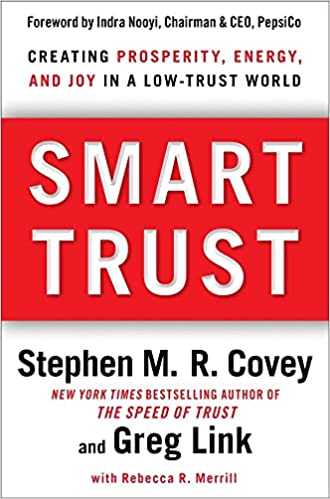Smart Trust – Stephen M. R. Covey and Greg Link with Rebecca R. Merrill

“Smart Trust” was published in 2012 and is focused on the idea of “smart trust,” which refers to the ability to extend trust in situations where it makes sense while also being aware of the risks and taking steps to manage them. The book emphasizes the importance of building trust in relationships and organizations and provides practical strategies for doing so.
Trust is a Competency
Trust is not just a character trait or a feeling; it’s a competency that can be developed and improved. By viewing trust as a skill, we can learn to identify the behaviors and actions that build trust and apply them in our interactions with others.
Trust Starts with Self-Trust
Before we can extend trust to others, we must first trust ourselves. By building self-awareness and self-confidence, we can cultivate a sense of inner trust that allows us to approach our interactions with others from a place of strength.
Trust Takes Time and Effort
Building trust takes time and effort, but it’s worth it. By consistently demonstrating trustworthiness and extending trust to others, we can create strong and lasting relationships that are built on a foundation of trust.
Smart Trust is a Mindset
Smart trust is not just a set of behaviors or strategies, it’s a mindset that involves a deep commitment to building and maintaining trust in all aspects of our lives. By cultivating a mindset of smart trust, we can create a more positive and fulfilling life experience.
Communication is Key to Building Trust
Clear, open, and honest communication is essential to building trust. When we communicate in a way that is respectful, transparent, and empathetic, we create an environment of trust and mutual understanding.
Start with Trust
When we start from a place of trust, we create a positive dynamic in our relationships and interactions. By assuming positive intent and being willing to extend trust to others, we can build stronger connections and achieve better outcomes.
Trust is a Two-Way Street
Trust is a two-way street, and it requires both parties to be willing to extend trust and be trustworthy. By focusing on building mutual trust and understanding, we can create stronger and more productive relationships.
Trust is the Foundation of Innovation
Innovation requires a culture of trust where people feel safe to take risks, share ideas, and collaborate. By creating an environment of trust and psychological safety, organizations can unleash the creativity and innovation of their teams.
Smart Trust Balances Risk and Reward
Smart trust involves a balance between risk and reward. Rather than blindly trusting or withholding trust, we can evaluate the situation and make informed decisions about when and how to extend trust. By doing so, we can build trust while minimizing the potential risks.
Trust is Essential in Leadership
Trust is essential in leadership because it creates a foundation of credibility and accountability. Leaders who are trusted are more effective at inspiring and motivating their teams, and they are better equipped to navigate challenges and achieve goals.

